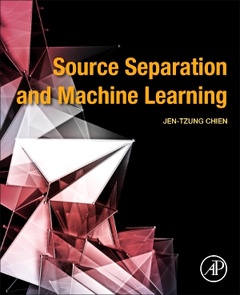Description
Source Separation and Machine Learning
Author: Chien Jen-Tzung
Language: English
Subject for Source Separation and Machine Learning:
Keywords
Assistive technologies; Bayesian learning; deep clustering; deep learning; deep neural network; discriminative learning; ensemble learning; Human computer interactions; Human machine interface; joint training; Machine learning; matrix factorization; Monitoring; multichannel source separation; music information retrieval; music signal separation; probabilistic nonnegative factorization; recurrent neural network; sampling method; sequence-to-sequence learning; signal processing; signal-channel source separation; singing voice separation; Smart sensor; source separation; sparse learning; speech dereverberation; speech separation; User centred design; User involvement; User profile; variational autoencoder; variational Bayesian
384 p. · 19x23.3 cm · Paperback
Description
/li>Contents
/li>Biography
/li>Comment
/li>
Source Separation and Machine Learning presents the fundamentals in adaptive learning algorithms for Blind Source Separation (BSS) and emphasizes the importance of machine learning perspectives. It illustrates how BSS problems are tackled through adaptive learning algorithms and model-based approaches using the latest information on mixture signals to build a BSS model that is seen as a statistical model for a whole system. Looking at different models, including independent component analysis (ICA), nonnegative matrix factorization (NMF), nonnegative tensor factorization (NTF), and deep neural network (DNN), the book addresses how they have evolved to deal with multichannel and single-channel source separation.
Part I Fundamental Theories1. Introduction2. Model-based blind source separation3. Adaptive learning machine
Part II Advanced Studies4. Independent component analysis5. Nonnegative matrix factorization6. Nonnegative tensor factorization7. Deep neural network8. Summary and Future Trends
- Emphasizes the modern model-based Blind Source Separation (BSS) which closely connects the latest research topics of BSS and Machine Learning
- Includes coverage of Bayesian learning, sparse learning, online learning, discriminative learning and deep learning
- Presents a number of case studies of model-based BSS (categorizing them into four modern models - ICA, NMF, NTF and DNN), using a variety of learning algorithms that provide solutions for the construction of BSS systems

